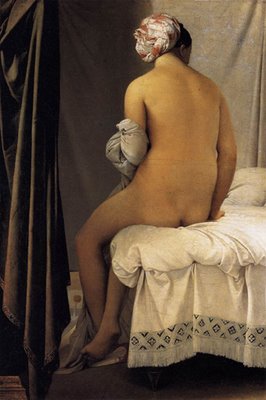
Jean-Auguste-Dominique Ingres (1780-1867) - The Bather, 1808
Language is a skin: I rub my language against the other. It is as if I had words instead of fingers, or fingers at the tip of my words. My language trembles with desire.
Roland Barthes
Nakedness reveals itself. Nudity is placed on display. The nude is condemned to never being naked. Nudity is a form of dress.
John Berger
Just because we're sisters under the skin doesn't mean we've got much in common.
Angela Carter
Resources
Ingres' Character and Personality (Grove Art Online):
Ingres was the staunchest, most conservative defender of the classical tradition, preaching an inflexible, if sometimes contradictory, doctrine of ideal beauty and the absolute supremacy of line and pure form over colour and emotion. He described himself as generally affable but with a ‘white hot’ temper if he felt himself wronged. His personality, like his art, was marked by a preference for the order of a familiar universe. He adjusted slowly to changes in daily habits and remained the worst sort of provincial traveller, comparing everything that was new to him unfavourably with the home equivalent.
According to Charles Blanc, Ingres’s friend and biographer, ‘Here was a man for whom invention was painful, but who bent his faults by a prodigious love of the beautiful’. In times of stress, Ingres was likely to react with a whole variety of physical symptoms, for example boils and atrocious headaches during the last few months of 1833, while he was working on the Apotheosis of Homer. There were times, however, when the pleasures of work were sweeter than ever before: ‘Every day I am shut away in my studio from morning to night. I am love struck by painting, I don’t possess it, it possesses me’. He was not at all the 19th-century bohemian artist; he loved every bourgeois comfort and expected his wife to look after his domestic needs.
In a letter of 7 July 1862 to Hippolyte Fockedey Victor Mettez described ‘le Père Ingres’ as ‘choleric, impatient, obstinate, good, naive, righteous, lazy . . . by moments eloquent and sublime...an incredible mélange’. This ‘mélange’ was echoed in an intimate sketch of Ingres by the composer Charles Gounod: ‘He had an enthusiasm which sometimes approached eloquence. He had the tenderness of a child and the indignations of an apostle. He was naive and sensitive. He was sincerely humble before the great masters, but fiercely proud of his own accomplishments’ (Mémoires d’un artiste, Paris, 1896).
Ingres’s passions for music (Gluck, Haydn, Mozart and Beethoven), for literature (Plutarch, Virgil, Homer, Shakespeare, Dante and Vasari) and the visual arts (Raphael and Michelangelo) were deep and lifelong. His friends were friends for life, unless they crossed him, and nothing pleased him more than his favourite music in the company of a select circle of friends. As a student, he was seen as too serious, intolerant of the usual studio antics; as a teacher, although he often acted as a father figure to his favourite students, he brooked no opposition: ‘Discussion was, unfortunately, not possible with M. Ingres’. And M. Ingres he remained, even to his family and closest friends.
More images by this artist can be accessed at:
Reading:
Ways of Seeing - John Berger
The Female Nude - Linda Nead
Visual and Other Pleasures - Laura Mulvey